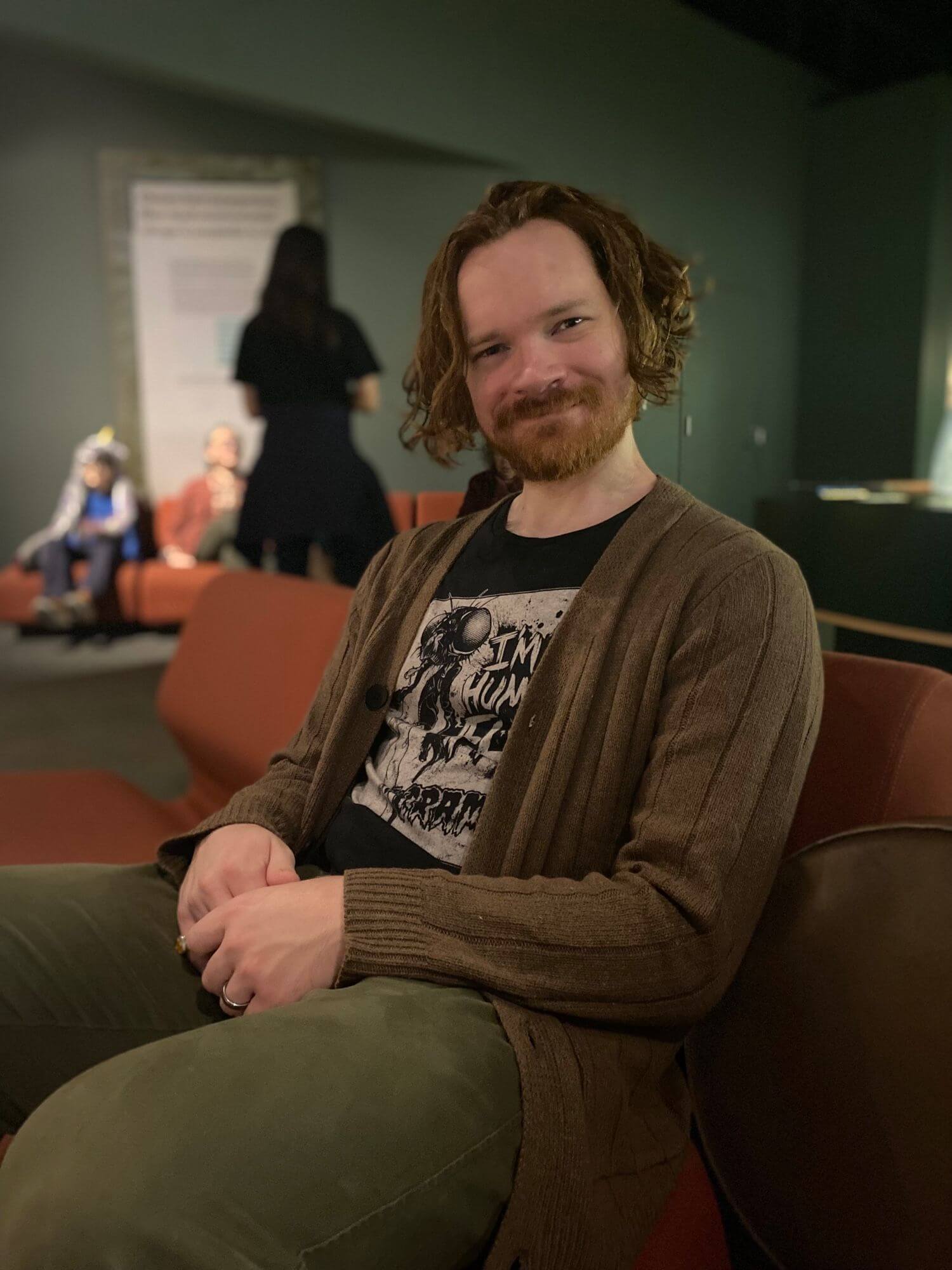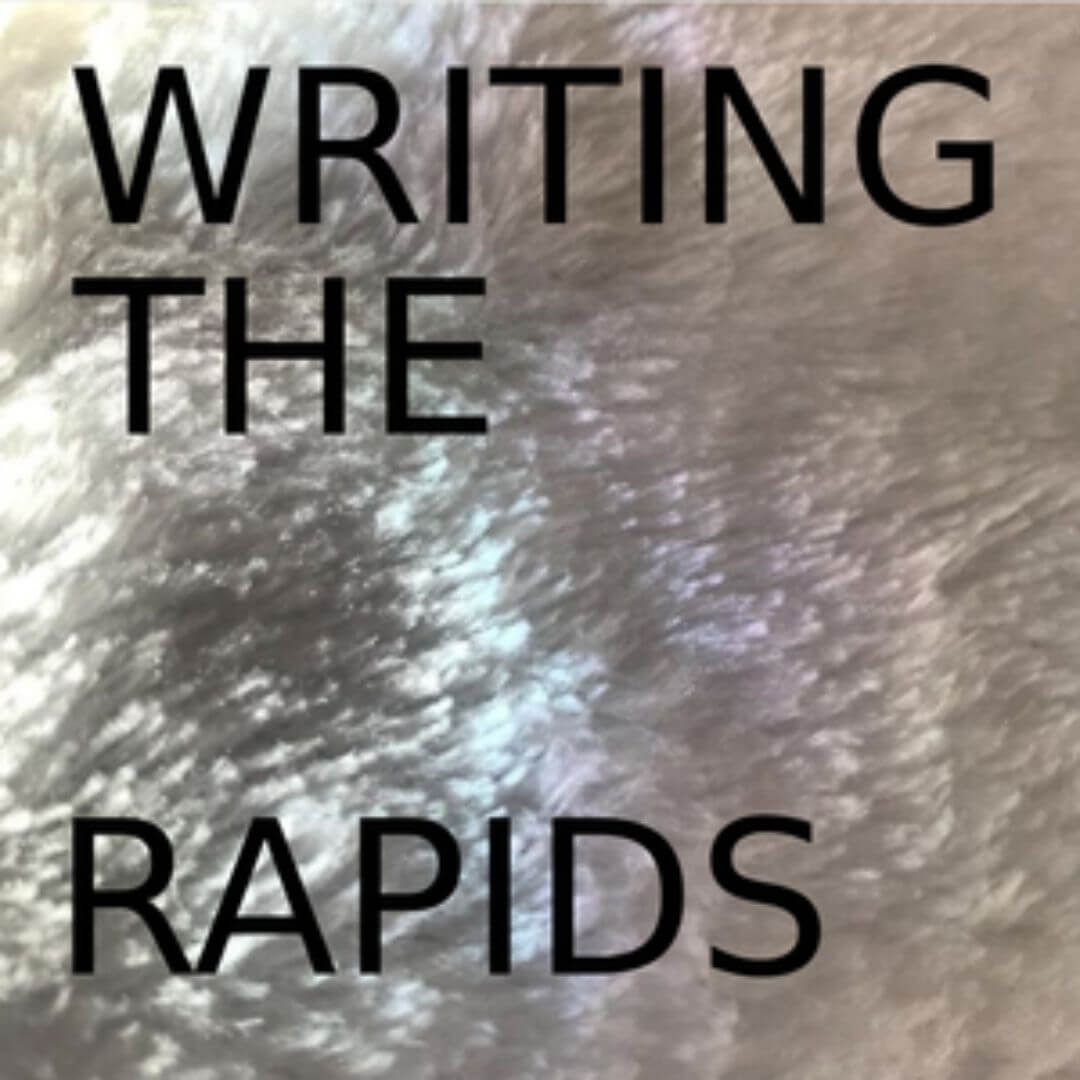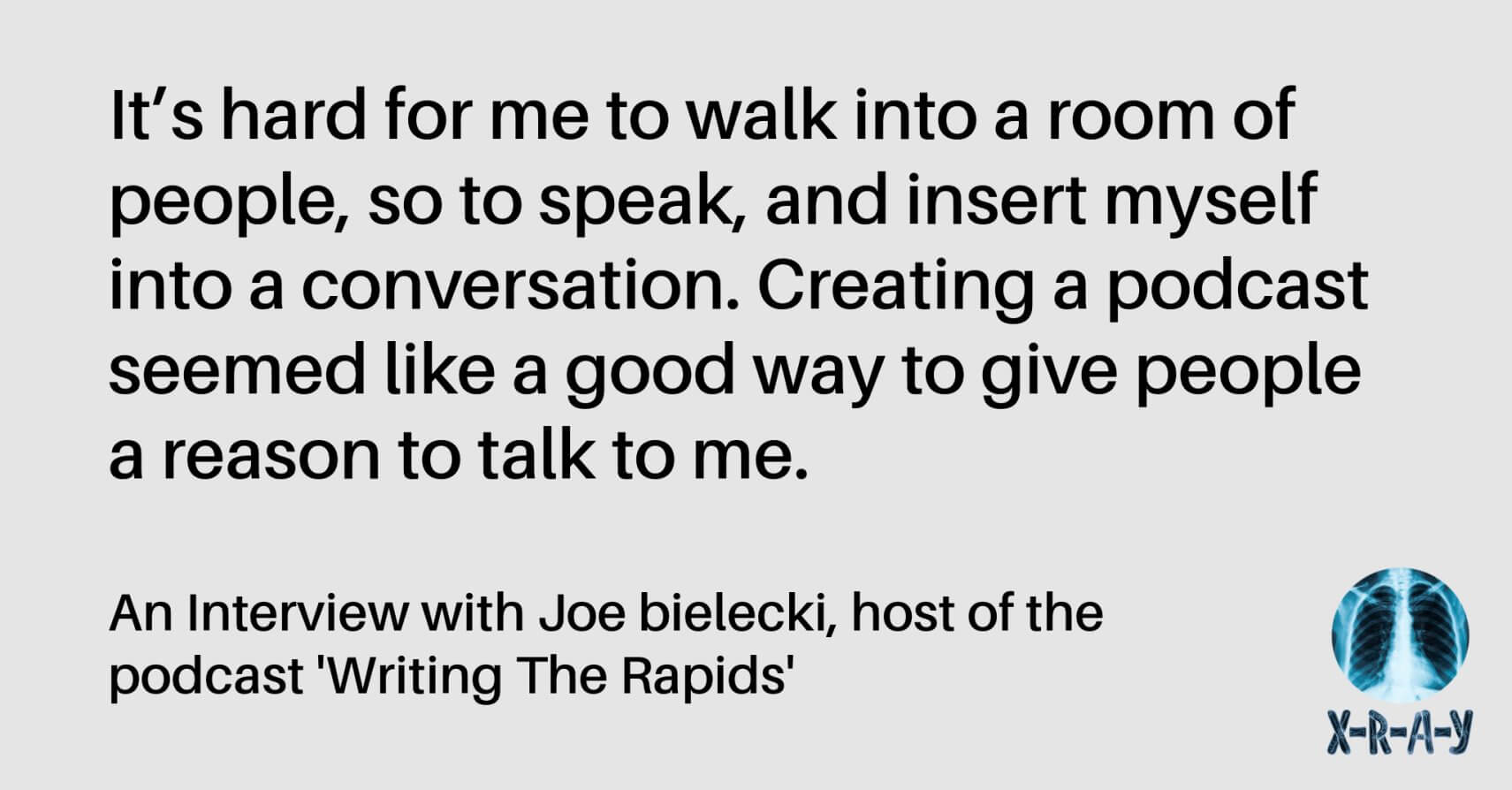Welcome to Transmissions, an interview feature in which X-R-A-Y profiles podcasts.
Joe bielecki is the host of the podcast Writing the Rapids, the author of the novel Tired from Alien Buddha Press, as well as several pieces of flash fiction that may or may not still be on the internet. He currently lives with his family in Grand Rapids, Michigan.

Writing the Rapids can be found at the website, Spotify, Patreon, Instagram, Youtube and X.

Rebecca Gransden: How would you describe the podcast to someone who is unfamiliar with what you do?
Joe bielecki: Writing the Rapids is a podcast where I talk to writers about writing. I’m not really clear from one day to another exactly what that means, however. I try to have conversations rather than interviews. I tend to warn my guests that I may simply muse about their writing without asking a question, for example.
RG: Does the podcast have a mission or manifesto?
JB: Not particularly a manifesto. I pick my guests based on the recommendations of past guests. Some of my goals when starting the show was to read more indie lit, meet new people, and see how people are connected.
RG: How long has the podcast been in existence, and how have you seen it grow over that time?
JB: My first episode was posted on February 13, 2018. I went from being a guy with a few pieces of flash fiction floating around, to a guy with a podcast. It is clear there are people who are capital F Fans of the show. Based on my Spotify metrics, the show is growing pretty steadily. When I tell people at work my follower count, how many average listens an episode gets, they seem impressed. It’s a niche subject, so I don’t expect it to get huge, but I’d like to think that I’ve helped a few books get sold.
RG: Where did the idea for the podcast come from?
JB: I wanted to talk to some of the indie writers I was reading that didn’t have lots of interviews available. I’m pretty shy, but wanted to make friends in a so-called scene that I enjoyed reading from. I wanted to explore publishers putting out books I like, etc. It’s hard for me to walk into a room of people, so to speak, and insert myself into a conversation. Creating a podcast seemed like a good way to give people a reason to talk to me.
RG: How did you decide upon a title for the podcast?
JB: The name came from a segment I did a few times for the morning show of the local NPR member station, I work for. I live in Grand Rapids, Writing the Rapids sounds like Riding the Rapids. When I decided to do the show on my own, and in a different way, I kept the name. Thinking of names is hard.
RG: Are there any podcasts that influenced or encouraged you to start the project?
JB: Not particularly. I’m a long time fan of Scott Johnson and the Frogpants Studios family of podcasts. I started listening to The Instance back in middle school or so and found the podcast format fascinating. Beyond that, I spent a lot of time in college watching late night talk show interviews with writers like David Foster Wallace and Harlan Ellison.
RG: What episode of the podcast would you recommend to someone who is new to what you do?
JB: My most listened to episodes are with B. R. Yeager, Sam Pink, and Jackie Ess, so probably one of those.
RG: How do you go about selecting what to feature on each episode? If your podcast features guests, how do you go about finding them?
JB: As noted above, I have a list of people provided by previous guests. From that list I look for someone who seems like they would say yes, and is writing something that seems immediately interesting to me at the time.
RG: If you are a writer, has the podcast impacted your writing life? and conversely, has a writerly disposition influenced the podcast?
JB: Having a writerly disposition is kind of the whole reason the podcast exists as it does. I wasn’t even sending my novel, Tired, out when I started. You hear me on the show mention my writing, ask about editing, ask about the publishing process. I ask this not only because I think it’s interesting inside baseball that people might want to hear, but because I largely still feel like an outsider as a writer and am trying to figure out how to get inside.
RG: Do you listen to podcasts?
JB: Not as much these days as I’d like. My listening time in general is lower than ever due to life circumstances, and what time I do have has largely been spent listening to the Horus Heresy audio books and music.
RG: What is the best podcast out there at the moment, the one you are excited for when each new episode drops?
JB: When I was listening to podcasts more regularly my favorite was Film Sack, by the aforementioned Scott Johnson.
RG: What do you dislike about podcasts?
JB: The low barrier to entry allows for a lot of saturation, so a lot of bad podcasts, which seems to have caused a lot of people to write off the medium entirely, which is a shame.
RG: Who is your dream guest?
JB: Someone very famous who would make the show blow up. Beyond that I’ve had a lot of people say yes who I thought would say no. I’m actually very content.
RG: Is there a theme or subject you are burning to cover?
JB: More ARGs, more Hypertext Lit, that type of thing. TTRPG guide as literature seems to be a creeping idea, I should look into that more.
RG: Is there a podcast that doesn’t exist, but you wish did?
JB: I have a couple ideas I’ve wanted to do for a while. That’s not in the spirit of the question, I understand. But it is my most honest answer.
RG: Is there a podcast that exists, but you wish didn’t?
JB: Yes, for sure. I won’t name them because I don’t want to draw people to them.
RG: For techheads, which single item of kit do you consider essential for the production of the podcast, and what would you say are the basics needed for those new to podcasting?
JB: Get a decent mic, get one with an XLR connection, not a USB. Get a mixer and learn signal chains. It’s much better to have more control rather than less. Maybe google meeting or zoom will record for you, I’d rather take the sound coming out of my mic and computer, and mix it myself. I also record into a Zoom H4N rather than my computer. That feels safer.
RG: If someone would like to support independent podcasts, what are the best ways to do this?
JB: As I say every intro, Patreon, Paypal, buy the host’s book. Or just talk about it. Spend more time talking about the things you love rather than hate. People remember what you talk about, so talk about things you want people to pay attention to, please.
RG: Looking back on the podcast, are there favorite episodes, episodes that stand out to you, or episodes that didn’t go as you would’ve liked?
JB: I just did an episode with Stacy Hardy, she was amazing. Jackie Ess was such a great guest. M Kitchell was so patient with me and informative. I really love talking to guys like Mike Corrao, Mike Klein, B. R. Yeager, John Trefry. A few episodes are out there where I feel like I could have done a better job. That’s life.
RG: What are your plans for the future?
JB: I plan to just keep going. I really like the show the way it is, and I don’t plan to change it. I’ve been threatening to make a YouTube channel for a while, and I’m really close to actually doing that.
RG: If you liked that, you may also like this. Are there any podcasts on a similar wavelength to your own that you would recommend to a listener who appreciates what you do?
JB: Wake Island Pod seems to have a lot of crossover fans with me. I’m not sure if they’re making new episodes or not though. I was recently on the Not Worth Living podcast, and I really like the conceit of that one.
Writing the Rapids can be found at the website, Spotify, Patreon, Instagram, Youtube and X.

